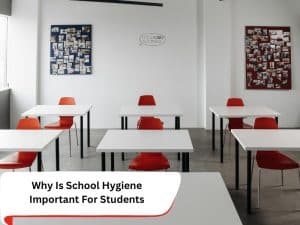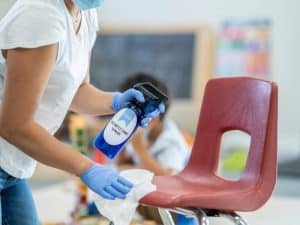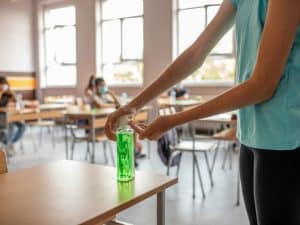Why Is School Hygiene Important For Students

Maintaining a clean school environment is crucial for students’ well-being and academic success. Schools are places where children spend a significant portion of their day, and ensuring that these spaces are hygienic can positively impact their health, concentration, and overall school experience. This article explores why school hygiene is important for students and how regular cleaning practices can benefit educational institutions.
Why is maintaining cleanliness crucial in schools?
Cleanliness in schools is more than just about aesthetics. It plays a pivotal role in providing a healthy and conducive learning environment. Here’s why it’s essential:
- Health and safety: A clean school environment helps reduce the spread of germs and bacteria, minimizing the risk of illness among students and staff.
- Improved air quality: Regular cleaning reduces dust and allergens in classrooms, which can help students with respiratory conditions thrive.
- Positive first impressions: A clean school fosters a positive image and promotes pride among students, teachers, and parents.
- Comfort and focus: A tidy and well-maintained environment allows students to feel comfortable and less distracted, leading to better focus during lessons.
How does a clean school environment enhance student concentration?
A clean and orderly school environment directly affects a student’s ability to concentrate. When students are surrounded by cleanliness, their mental and emotional state is positively impacted. Additionally, a clean environment plays a vital role in preventing illness in schools, ensuring students stay healthy and focused. Here’s how a clean school promotes better focus:
- Fewer distractions: A clutter-free space reduces distractions, allowing students to focus more on their lessons.
- Improved mood: Clean and fresh environments contribute to a more positive atmosphere, which can uplift students’ spirits and motivate them to engage with their studies.
- Reduced stress: A school’s cleanliness can also reduce stress or anxiety, allowing students to feel more relaxed and ready to learn.
- Better cognitive function: Studies suggest that a tidy space can enhance cognitive performance, leading to better information retention and improved academic performance.
What are the risks of poor hygiene in schools?
Neglecting hygiene standards in schools can lead to several risks, including:
- Spread of illnesses: Poor hygiene increases the spread of germs, leading to higher absenteeism.
- Infections and allergies: Unclean environments can trigger skin infections, allergies, and respiratory issues.
- Decline in academic performance: Sick or distracted students struggle to perform well academically.
- Negative impact on mental health: A dirty environment can cause discomfort, affecting students’ mental and emotional well-being.

How does regular cleaning contribute to a safe and healthy school environment?
Regular cleaning is essential in maintaining a safe and healthy school environment. It goes beyond surface-level tidying up and involves thorough disinfection and sanitization. Here’s how it helps:
- Eliminates potential hazards: Regular cleaning helps identify and eliminate safety hazards, such as spills or loose objects, that could cause accidents. Additionally, outdoor school cleaning and safety are crucial for ensuring that playgrounds and outdoor areas remain clean, safe, and free from potential hazards.
- Maintains hygiene standards: A consistent cleaning routine ensures that the school is always in top shape, making it easier to maintain high hygiene standards.
- Reduces pests: Regular cleaning helps keep pests like rodents and insects at bay, which could otherwise lead to health problems for students.
Why is disinfection crucial in preventing the spread of illnesses in schools?
Disinfection is one of the most effective ways to prevent the spread of illnesses in schools. With so many students interacting in close quarters, it’s important to regularly disinfect high-touch surfaces like desks, doorknobs, and shared equipment. Here’s why disinfection is so crucial:
- Kills germs and viruses: Disinfectants target harmful germs, bacteria, and viruses that can spread rapidly in school environments, including flu, colds, and even more serious diseases.
- Protects vulnerable students: Disinfection is essential for students with weakened immune systems, as it helps protect them from infections.
- Prevents outbreaks: Regular disinfection reduces the chances of widespread illness in the school, keeping absenteeism rates low.
- Peace of mind: Knowing that the school is being regularly disinfected helps parents and staff feel confident that their students are safe.
Ensuring regular disinfection supports the overall school cleaning standards, contributing to a hygienic environment for all.
How can schools ensure a consistent hygiene routine?
To maintain consistent cleanliness, schools can:
- Implement a cleaning schedule for regular cleaning, focusing on high-touch surfaces.
- Assign dedicated cleaning staff for efficient daily tasks.
- Provide hygiene supplies like hand sanitisers and disinfectant wipes.
- Conduct regular inspections to ensure cleaning standards are met.

How can a professional cleaning service help schools maintain hygiene standards?
Hiring a professional cleaning service can significantly improve the hygiene standards of a school. These experts bring valuable knowledge and resources to ensure thorough and effective cleaning. Additionally, professional cleaning services provide effective school cleaning solutions tailored to meet the specific needs of each school. Here’s how experts can help:
- Expert knowledge and equipment: Professional cleaners use high-quality tools and supplies, offering better results than typical products.
- Consistent results: With a dedicated team, professional services ensure hygiene standards are maintained without missed spots.
- Tailored cleaning plans: Cleaning services are customised to meet each school’s specific needs, from classrooms to cafeterias.
- Focus on high-traffic areas: Professionals prioritize cleaning high-traffic areas like hallways, bathrooms, and communal spaces to ensure regular sanitation.
What role does staff involvement play in maintaining school hygiene?
Staff involvement is key to maintaining school hygiene. Teachers, custodians, and administrators all play a role in ensuring a clean and safe environment. Here’s how they can contribute:
- Modelling good hygiene: Staff should lead by example with practices like hand washing and using hand sanitisers.
- Encouraging student participation: Teachers can motivate students to keep their spaces tidy and responsible for their hygiene.
- Monitoring hygiene standards: Administrators should oversee cleaning schedules and address any hygiene issues promptly.
Partner with JBM Janitorial for professional school cleaning
At JBM Janitorial, we understand the importance of maintaining a clean and safe school environment. Our professional cleaning services are tailored to meet the unique needs of educational institutions, ensuring that students and staff enjoy a healthy, hygienic space. From regular cleaning and disinfection to specialized services, we’re here to help. Experience top-tier school cleaning services with JBM Janitorial and discover how we can help your school maintain the highest hygiene standards!
